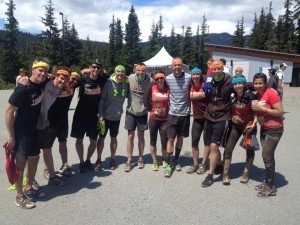Lessons from Tough Mudder
Last week team Okanagan Peak Performance Inc headed up to Whistler for Tough Mudder.
[caption id="attachment_4245" align="aligncenter" width="300"] Team OPP post-Whistler Tough Mudder
For some of us this was our fourth or fifth 'Mudder. And for others this was the first experience. Regardless of wether this was our first or multiple race of this type there are a number of take-aways to help others considering doing the same.
1. Saturday's Race is Fueled by Wednesday's Meal You know how people talk about a 'pre-game meal'? The food you eat before the big game to ensure you have all the proper nutrients and hydration to win the big game. Well, instead of thinking of this as the meal right before the race start thinking of a few days or even a week out.
Eat better quality foods. Carry a water bottle and ensure you are properly hydrated. Pack enough food for your travel to the race. Bring food for breakfast on race day. Ignoring any one of these tips and you potentially jeopardize the results that might have been.
2. Hydration This year at TM teams were taking an average of 4 to 4.5 hours to complete the course. And this year the conditions were warm for Whistler at 23 C. So when you consider you will be exerting for that long in warm climate you need to ensure that you don't become dehydrated. As soon as you sense thirst you are already dehydrated and performance is compromised.
[caption id="attachment_4246" align="aligncenter" width="300"] Replacing only water can create problems
Replacing only water can create problems
But there's another thing to keep in mind. You don't just lose water. Sweat contains salt and you need to replenish what you are losing. I don't want to get too sciency on this but imagine if your body has a very specific salt concentration in the cells and blood. When you sweat some of this salt is lost. Now if all you do is drink water to hydrate you will dilute the remaining salt in the body making your hydration, or dehydration, status even worse. Make sure for events in warm weather, of longer than an hour, especially if you are heavy sweater, that whatever you drink includes electrolytes.
3. Post Race How you feel the next day has as much to do with your fitness, strength and mobility as it does with what you do after the race.
Want to feel link crap? Start slamming Dos Equis beer and park yourself in a chair until you have to find a porta-potty. This will ensure everything cramps and tightens up on you.
On the other hand you could hold off on the beers and have a recovery shake with protein and carbohydrate. Keep moving as much as possible or at minimum stand. If there's a pool where you're staying jump in and do some easy strokes. Focus on relaxed breathing and do some gentle stretching. And if there's a hot-tub nearby alternate 5 minutes in each to get some vasodilation and constriction happening to promote even more circulation.
4. Weak Links Each year after the race our team goes to a restaurant in Whistler village where you can watch everyone walk past. And it's fun to watch the people limping past. Hip flexors are lit up, ankles are sprained, knees are twisted and overall the body is in pain.
During the race each of these people probably noticed something change. An area of the body felt different. Maybe something tightened up. Maybe something else had a trigger point. Maybe something felt weak.
The point is that we can gain the most and the best feedback during race conditions. And so we need to really pay attention to what we notice. What joint felt tight? Where exactly? At what point during the race? How did it feel after?
Knowing the answers to these will allow you to fine tune your training and get the most out of it. As well, when you go for manual therapy such as physio or massage your practitioner will be able to help you that much more when can answer questions such as these.
5. Breathing One thing I really focussed on during the race was my breathing. Part of it was because I'm really interested in that type of thing but also because I had an upper respiratory tract infection. And when I travelled to Colorado this infection moved to my ears and nasal sinuses due to the pressure changes. I took antibiotics upto the day before the race and then prayed for the best.
And I really didn't want to make myself more ill. So I was consciously focussed on my breathing. Was is belly or chest? Was it laboured or relaxed? Could I feel the infection moving deeper into my chest? Was the breathing balanced in terms of inhalation and exhalation?
There are lots of ways to look at your breathing? And this helps to distract over a longer race such as this. And seeing as how I didn't feel more ill the day after I'm assuming paying attention to my breathing served me well.
Summary Whether you have a TM race coming up or not keep these tips in mind to make the event and recovery a little better. If you are planning to do a Tough Mudder race pick up a copy of our program here to ensure a safe and successful race.
Chris
When you subscribe to the blog, we will send you an e-mail when there are new updates on the site so you wouldn't miss them.

Comments